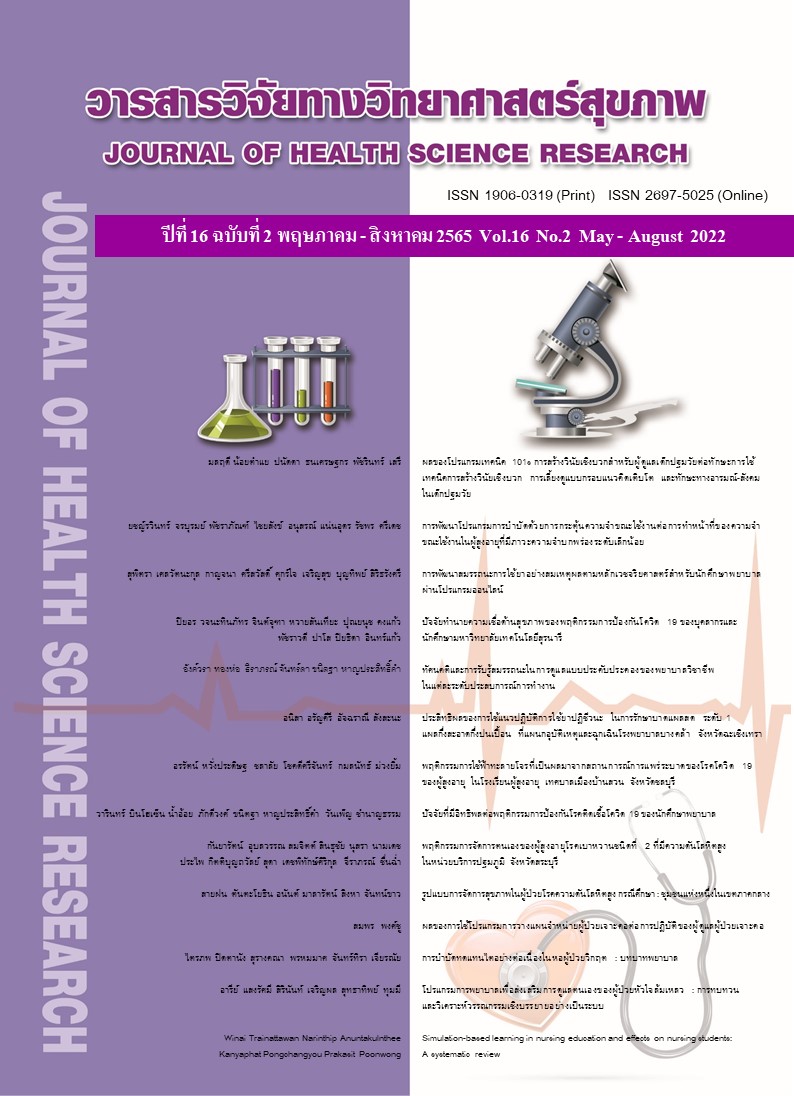ทัศนคติและการรับรู้สมรรถนะในการดูแลแบบประคับประคองของพยาบาลวิชาชีพในแต่ละระดับประสบการณ์การทำงาน
Main Article Content
บทคัดย่อ
บทนำ : พยาบาลมีบทบาทสำคัญในการดูแลแบบประคับประคองผู้ป่วยและครอบครัว การศึกษาปัจจัยที่มีผลต่อสมรรถนะการดูแลผู้ป่วยแบบประคับประคองยังไม่ชัดเจน โดยเฉพาะทัศนคติต่อความตาย และประสบการณ์การทำงานต่อสมรรถนะการดูแลผู้ป่วยของพยาบาล
วัตถุประสงค์การวิจัย : เพื่อศึกษาข้อมูลและความสัมพันธ์ระหว่างทัศนคติ และประสบการณ์การทำงานกับการรับรู้สมรรถนะในการดูแลแบบประคับประคองของพยาบาลวิชาชีพ
วิธีการวิจัย : การวิจัยเชิงบรรยาย ตัวอย่างเป็นพยาบาลวิชาชีพ โรงพยาบาลตติยภูมิแห่งหนึ่ง สังกัดกระทรวงสาธารณสุข ในเขตภาคกลาง จำนวน 246 ราย สุ่มตามสัดส่วนจำนวนในแต่ละหอผู้ป่วย เก็บข้อมูลด้วยแบบสอบถาม วิเคราะห์ข้อมูลโดยใช้สถิติบรรยายและสถิติสหสัมพันธ์ของเสปียร์แมน
ผลการวิจัย : ทัศนคติของตัวอย่างอยู่ในระดับดี (M=116.39, SD=8.55) พยาบาลกลุ่มที่มีประสบการณ์การทำงาน 2-4 ปี มีคะแนนทัศนคติมากที่สุด (M=116.21, SD=7.14) และมีการรับรู้สมรรถนะระดับปานกลาง (M =183.81, SD =44.83) พยาบาลกลุ่มที่มีประสบการณ์การทำงานน้อยกว่า 2 ปี มีคะแนนการรับรู้สมรรถนะมากที่สุด(M =193.09, SD =47.84) ทัศนคติมีความสัมพันธ์ทางบวกกับการรับรู้สมรรถนะ (r =.300; p <.01) ส่วนประสบการณ์การทำงานไม่มีความสัมพันธ์กับทัศนคติและการรับรู้สมรรถนะในการดูแลผู้ป่วยแบบประคับประคอง
สรุปผล : พยาบาลทุกระดับประสบการณ์การทำงานมีทัศนคติที่ดีและมีการรับรู้สมรรถนะอยู่ในเกณฑ์ความมั่นใจปานกลาง ทัศนคติที่ดีส่งผลต่อการรับรู้สมรรถนะในการดูแลผู้ป่วยแบบประคับประคองเพิ่มขึ้น อย่างไรก็ตามประสบการณ์การทำงานไม่มีผลต่อทัศนคติและการรับรู้สมรรถนะเกี่ยวกับการดูแลผู้ป่วยแบบประคับประคอง เพื่อการพัฒนาคุณภาพการดูแลพยาบาลควรได้รับการพัฒนาสมรรถนะการดูแลผู้ป่วยแบบประคับประคอง
Downloads
Article Details

อนุญาตภายใต้เงื่อนไข Creative Commons Attribution-NonCommercial-NoDerivatives 4.0 International License.
บทความที่ได้รับการตีพิมพ์เป็นลิขสิทธิ์ของวิทยาลัยพยาบาลบรมราชชนนี จังหวัดนนทบุรี
ข้อความที่ปรากฏในบทความแต่ละเรื่องในวารสารวิชาการเล่มนี้เป็นความคิดเห็นส่วนตัวของผู้เขียนแต่ละท่านไม่เกี่ยวข้องกับวิทยาลัยพยาบาลบรมราชชนนี จังหวัดนนทบุรี และคณาจารย์ท่านอื่น ในวิทยาลัยฯ แต่อย่างใด ความรับผิดชอบองค์ประกอบทั้งหมดของบทความแต่ละเรื่องเป็นของผู้เขียนแต่ละท่าน หากมีความผิดพลาดใด ๆ ผู้เขียนแต่ละท่านจะรับผิดชอบบทความของตนเองแต่ผู้เดียว
เอกสารอ้างอิง
Phengjard J. Nurse’s role in palliative care. Journal of Boromarajonani College of Nursing, Bangkok. 2014;30(1):100-9. (in Thai).
Rugsanor I, Chaiviboontham C, Pokpalagon P. Knowledge, attitude, and self efficacy in end-of-life care of senior military student nurses. Journal of The Royal Thai Army Nurses. 2018;19(Suppl): 242-50. (in Thai).
Kim S, Lee K, Kim S. Knowledge, attitude, confidence, and educational needs of palliative care in nurses caring for non-cancer patients: a cross-sectional, descriptive study. BMC Palliat Care. 2020;19(1):105. doi: 10.1186/s12904-020-00581-6.
Wilson O, Avalos G, Dowling M. Knowledge of palliative care and attitudes towards nursing the dying patient. Br J Nurs. 2016;25(11):600-5. doi: 10.12968/ bjon.2016.25.11.600.
Harden K, Price D, Duffy E, Galunas L, Rodgers C. Palliative care: improving nursing knowledge, attitudes, and behaviors. Clin J Oncol Nurs. 2017;21(5):E232-8. doi: 10.1188/17.CJON.E232-E238.
Chimchalong R, Palliative nurse specialist competencies and the role of nurse in palliative care. Royal Thai Army Medical Journal. 2021;74(3):233-9. (in Thai).
Nuekwen P, Hanprasitkam K, Junda T. Nurses’ perceptions and practice on palliative care. Thai Journal of Cardio-Thoracic Nursing. 2016;27(1):128-41. (in Thai).
Nupinit W, Nilmanat K, Mutchim Y. Selective factors related to intensive care units’ registered nurses’ competency in caring for terminally ill patients. Thai Journal of Nursing Council. 2017;32(4): 94-106. (in Thai).
Satsin T, Matchim Y, Thongthawee B. Emergency nurses’ competency in the provision of palliative care and related factors. Songklanagarind Journal of Nursing. 2017;37(Suppl):41-50. (in Thai).
Keawtong W, Rawiworakul T, Kalampakorn S, Kerdmongkol P. Competencies of palliative care among community nurses in primary care units. Journal of The Royal Thai Army Nurses. 2017;18(Suppl1):74-83. (in Thai).
Nguyen LT, Yates P, Osborne Y. Palliative care knowledge, attitudes and perceived self-competence of nurses working in Vietnam. Int J Palliat Nurs. 2014;20(9):448-56. doi:10.12968/ijpn.2014.20.9.448.
Siripukdeekan C, Boonrubpayap B. Nursing career ladder development. Journal of The Royal Thai Army Nurses. 2014;15(3):75-80. (in Thai).
Benner P. From novice to expert. Am J Nurs. 1982;82(3):402-7. PMID: 6917683
Frommelt KH. Attitudes toward care of the terminally ill: An educational intervention. Am J Hosp Palliat Care. 2003;20(1):13-22. doi: 10.1177/104990910302000108.
Jaiboon S, Junda T, Sumdaengrit B. Knowledge and perceived self-competence in palliative care among professional nurses with less than 2 years working experience in an autonomous university hospital. Kuakarun Journal of Nursing. 2021;28(1): 82-93. (in Thai).
Desbiens JF, Fillion L. Development of the palliative care nursing self-competence scale. J Hosp Palliat Nurs. 2011;13(4): 230-41. doi: 10.1097/NJH.0b013e318213d300.
Loknimith W, Janda T. Self-perceived palliative care competencies of nurses working in a university hospital within less than two years of receiving bachelor's degrees. Journal of The Royal Thai Army Nurses. 2020;21(3):373-81. (in Thai).
Rongmuang D, Nakchattree C, Thongphet P. Palliative and end-of-life care competencies among registered nurses in regional health 11. Journal of The Royal Thai Army Nurses. 2018;19(Suppl):412-22. (in Thai).
Shen Y, Nilmanat K, Promnoi C. Palliative care nursing competence of chinese oncology nurses and its related factors. J Hosp Palliat Nurs. 2019;21(5):404-11. doi: 10.1097/NJH.0000000000000581.
Chulyamitaporn R, Siritharungsri B, Boonrod W. The development of ethical decision making program for taking care of patients with the end of life by professional nurses at phramongkutklao hospital. Journal of The Royal Thai Army Nurses. 2013;14(1):41-50. (in Thai).
Srisuwan N, Matchim Y, Nilmanat K. Nurses’ competency in communication with patients at the end of life and their families and related factors. Songklanagarind Journal of Nursing. 2014;34(3):109-24. (in Thai).


